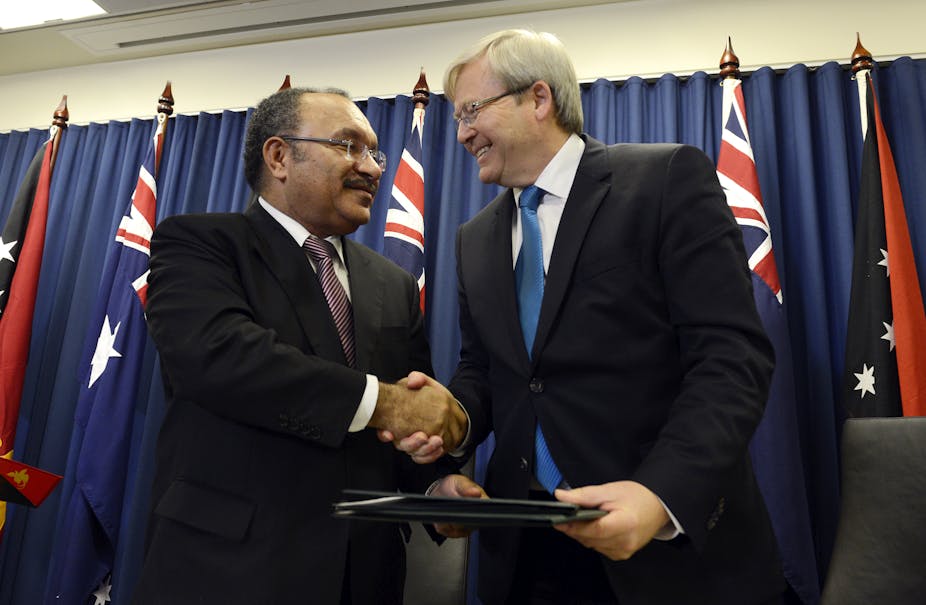The precise details of the refugee resettlement deal struck between Australian prime minister Kevin Rudd and his Papua New Guinean counterpart Peter O'Neill are yet to be revealed.
But what we do know, however, is that the agreement will see all boat arrivals without visas to Australia diverted to PNG for processing and potential resettlement. This sounds like a political and short-term stroke of genius to appeal to an important electoral minority in Australia, but regionally and for the long-term sounds like another “regional solution” disaster.
From the theatrics that came with the announcement, as well as the media onslaught via YouTube and social media, this announcement is deemed by the government (and grudgingly by the opposition to some degree) to be the “silver bullet” to end the flow of the boats.
Australian politicians have been working to find a solution to the increase in boat arrivals ever since the 2001 Tampa incident and then prime minister John Howard’s subsequent declaration that: “we will decide who comes to this country and the circumstances in which they come”. Since then the issue of refugees in Australia has been inextricably linked to border protection. The view holds that as long as we can police our borders we are in control of who comes here and how many people come here.
Australia’s borders are amongst the best protected and policed considering the sheer size of the continent. The issue of control, however, is beside the point, as every boat carrying asylum seekers without visas which arrives on Australia’s shore is doing so legally. It is, after all, legal to ask for asylum of a signatory to the United Nations’ refugee convention.
Legality though is not really the issue here. Others have written in more detail about the anxieties of a nation built by “boat people” and the fear of boats full of “others” arriving on our shores that may displace us, our way of life and culture. Since Vietnamese boat arrivals in the 1970s there has been a steady unease in dealing with the uncontrollable influx of others not regimented by the migration system.
As Howard himself said in the same speech quoted above in 2001:
…we are a generous open hearted people taking more refugees on a per capita basis than any nation except Canada, we have a proud record of welcoming people from 140 different nations.
But these refugees arrived in Australia as resettled refugees via an ordered and controllable system, not a queue. Nonetheless, it was a system that allows us to decide who we let in and who we prioritise.
The resettlement program in Australia is amongst the most generous systems around the world. It offers a relatively direct path to citizenship and an active engagement with the host country that some others do not. This proud history is now being endangered by the division of the system, supposedly rewarding those refugees waiting in camps and urban settings around the world and punishing those who risk the perilous journey by boat.
Many refugees have perished trying to make their way to Australia and the government responded with an Expert Panel on Asylum Seekers. Although its recommendations were fully taken on board by the government, one crucial element of the report - namely the imperative of a regional cooperation plan on protection and asylum - has received scant attention by policy makers.
The PNG deal may raise hopes that finally the Australian government is talking about a regional solution, with regional partners and actual agreements in place. However, at the moment it looks more like a policy for regionally dumping refugees for Australia’s domestic political gain. With our election cycles, regional solutions to the refugee crisis in the Asia Pacific region seem doomed to short-term, rushed jobs. Without the major regional transit countries Malaysia and Indonesia at the table, the PNG deal remains just another bilateral contract that will now firmly bind Australia to O’Neill’s administration in PNG.
This creates a co-dependency that is based on substantial Australian financial aid (to be largely carried by the aid budget) for the acceptance of refugees. This sets a worrying precedent for how Australia’s aid budget is spent, and already Australia is the third biggest recipient of our foreign aid budget after PNG and Indonesia. Australia will also be dependent on PNG in regards to our refugee convention obligations that will be effectively serviced by PNG authorities.
Real solutions take time and meaningful engagement with key regional players, namely Malaysia and Indonesia. Australia could lead these efforts, not just as the paymaster but by engaging regional partners to deal with the ongoing ethnic conflicts in Myanmar, and taking an active role in the wider region, such as tackling human rights abuses in Sri Lanka.
All of this takes time, political will and compromise between partners. It is not solved by Australia demanding regional countries to succumb to our short-term political exigencies.

